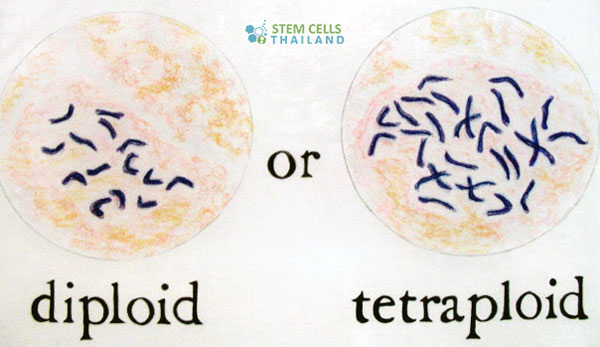Tetraploid complementation assays are used to examine the potency of a particular stem cell. Scientific studies in medical journals performed on chimeras (the mixture of cells of two distinct animals) revealed that the fusion of two embryos with eight cells resulted into cells containing four sets of chromosomes referred to as tetraploid cells, which are predisposed to developing into an extra-embryonic tissue, i.e., the placenta.

The Tetraploid Complementation Assay is a powerful experimental technique used to test the pluripotency of embryonic stem cells (ESCs) or induced pluripotent stem cells (iPSCs). In this assay, pluripotent cells are introduced into a tetraploid blastocyst, which is then implanted into a surrogate mother. If the implanted cells are truly pluripotent, they will give rise to an entire organism, demonstrating their ability to differentiate into all the cell types necessary for development.
Tetraploid Complementation Assays
- Generation of Tetraploid Embryos: embryos at the two-cell stage are subjected to an electric pulse to induce cell fusion, leading to tetraploid cells with four sets of chromosomes. These cells can develop into a blastocyst, but they cannot form a viable organism on their own.
- Injection of Pluripotent Cells: Pluripotent cells, like ESCs or iPSCs, are injected into the tetraploid blastocysts.
- Implantation into Surrogate Mother: The injected blastocysts are then implanted into the uterus of a surrogate mother.
- Assessment of Pluripotency: If the pluripotent cells are truly capable of differentiating into all cell types, they will compensate for the developmental deficiencies of the tetraploid cells, giving rise to a viable organism.
Applications of Tetraploid Complementation Assays
- Pluripotency Testing: This is the most stringent test for determining the pluripotency of stem cells.
- Developmental Biology Research: The assay can provide insights into the requirements for early mammalian development.
- Regenerative Medicine: Verifying the pluripotency of iPSCs or ESCs is crucial before their use in therapeutic applications.
Current Limitations and Challenges
- Ethical Concerns: The generation and destruction of embryos for this assay raise ethical issues.
- Technical Complexity: The procedure is technically demanding and requires specialized skills and equipment.
- Species Limitations: Currently, this assay is most commonly performed in mice, and its applicability to human pluripotent cells is not yet well-established.
- Cost and Time: The assay is time-consuming and expensive, particularly because it involves the generation and maintenance of animals.
Current Research and Future Directions
- Human Pluripotent Cells: Research is ongoing to adapt this assay for testing human pluripotent cells.
- Improving Efficiency: Efforts are being made to make the assay more efficient and reliable, with the aim of reducing both costs and ethical concerns.
The embryo is not generated by the tetraploid cells; rather, it develops from the injected stem cells (diploid). This predisposition has been subjugated to examine a stem cell’s potency. The initial process involves the injection of stem cells into a tetraploid embryo. An embryo should develop if the injected stem cells happen to be pluripotent. Shall it yield a negative result, or should the ensuing embryo fail to endure until birth, then it means that the injected cells were not pluripotent.
The Tetraploid Complementation Assay is a critical tool for verifying the pluripotency of stem cells and has vital applications in regenerative medicine and developmental biology. However, it comes with technical and ethical challenges that need to be carefully considered.

